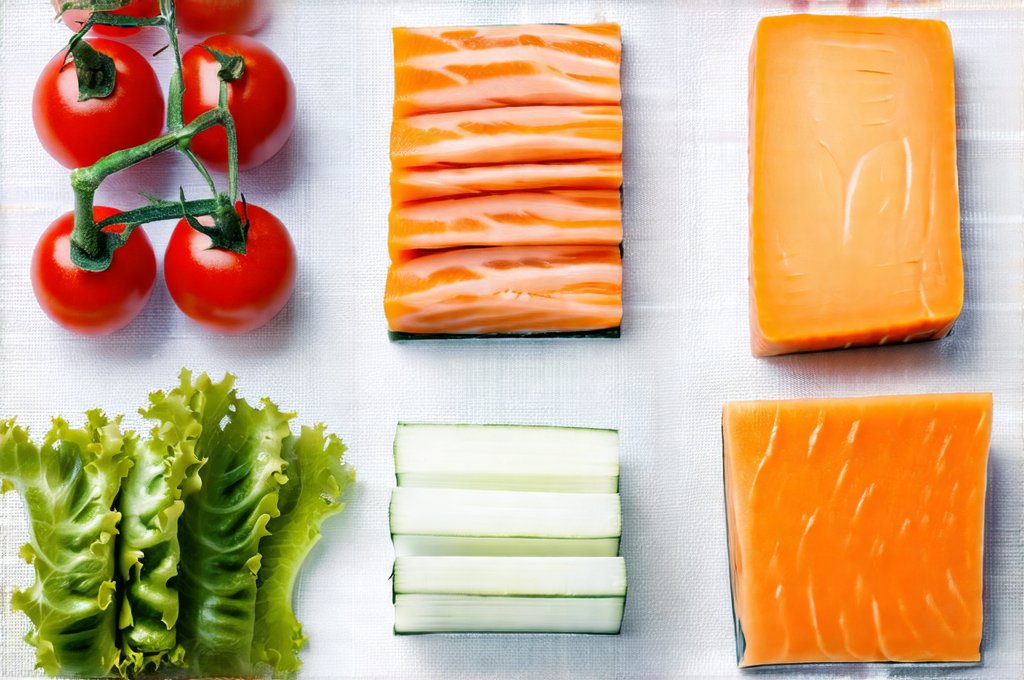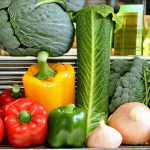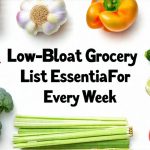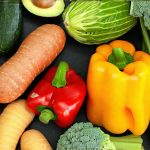Bloating is an incredibly common digestive issue affecting millions. It’s not usually a serious condition, but it can be profoundly uncomfortable, impacting daily life and self-confidence. Many factors contribute to bloating – from the speed at which we eat to stress levels and underlying gut health. However, one of the most significant influences on how bloated we feel is what we eat. While eliminating all potentially bloating foods isn’t realistic or desirable (and can even be detrimental), making mindful choices at the grocery store and incorporating anti-bloating staples into your weekly shop can dramatically reduce discomfort and promote a happier gut. This article will guide you through building that list, focusing on foods that actively support digestion and minimize gas production, offering practical advice for real-world shopping and eating habits.
Understanding why certain foods cause bloating is key to making informed decisions. Often, it’s not the food itself, but how our bodies process it. Foods high in FODMAPs (fermentable oligosaccharides, disaccharides, monosaccharides, and polyols) are common culprits. These carbohydrates aren’t fully absorbed in the small intestine and travel to the large intestine where they are fermented by bacteria, producing gas as a byproduct. Other factors include fiber content – while beneficial overall, excessive fiber intake can initially cause bloating until your gut adjusts. Finally, certain foods simply require more digestive effort, leading to increased gas production. The goal isn’t about restriction, but about balance and mindful inclusion of foods that support optimal digestion. You may find it helpful to review a grocery list for GERD diet as you plan your shopping trip.
Gut-Friendly Fruits & Vegetables
Fruits and vegetables are essential for overall health, but some choices are significantly less bloating than others. Generally, fruits with lower fructose levels and vegetables that aren’t part of the cruciferous family (broccoli, cauliflower, cabbage) tend to be better tolerated. Berries – blueberries, strawberries, raspberries – are excellent choices, offering antioxidants and fiber without excessive fermentable carbohydrates. Bananas, especially slightly green ones, contain resistant starch which feeds beneficial gut bacteria but in a way that produces less gas than highly ripe bananas. Citrus fruits like oranges and grapefruit can be well-tolerated by many, though individual sensitivities vary.
When it comes to vegetables, leafy greens are your best friend. Spinach, kale, romaine lettuce, and arugula are packed with nutrients and generally easy to digest. Root vegetables like carrots and sweet potatoes provide fiber and vitamins without the same bloating potential as their cruciferous counterparts. Zucchini and cucumbers have high water content which can aid digestion and prevent constipation – a common contributor to bloating. It’s important to note that preparation matters too. Roasting or steaming vegetables is often easier on the digestive system than consuming them raw, especially if you are sensitive.
Finally, consider incorporating ginger and turmeric into your grocery list. These powerful anti-inflammatory spices can help soothe digestion and reduce inflammation in the gut, contributing to overall comfort. Add fresh ginger to smoothies or stir-fries, and use turmeric generously in curries and soups. Remember that everyone’s tolerance levels differ; paying attention to your body’s response is crucial. A grocery list for GERD diet can help you find anti-inflammatory options.
Protein & Healthy Fats for Digestion
Protein is vital for satiety and muscle maintenance, but certain protein sources can contribute to bloating. Highly processed meats and excessive red meat should be limited. Opting for leaner protein sources like chicken breast, turkey, fish (especially salmon rich in omega-3 fatty acids), and plant-based options such as tofu and lentils is a good starting point. Lentils, while containing some FODMAPs, are generally well-tolerated when properly prepared – soaking them overnight can help reduce their fermentability.
Healthy fats play an important role in digestion and nutrient absorption. Avocado provides healthy monounsaturated fats and fiber, but consume in moderation as it’s relatively high in fat content. Olive oil is another excellent choice for cooking and salad dressings. Nuts and seeds provide essential fatty acids and fiber, but again, portion control is key – excessive nut consumption can lead to digestive upset. Chia seeds and flaxseeds are particularly beneficial due to their omega-3 content and soluble fiber which aids digestion.
Avoid overly processed oils and trans fats as these can disrupt gut health and contribute to inflammation. Focus on whole, unprocessed sources of protein and fat that support a healthy digestive system. Prioritizing quality over quantity is essential when choosing your proteins and fats for anti-bloating purposes. If you experience sudden acid spikes, checking best grocery items can provide quick relief options.
Hydration & Herbal Teas
Staying adequately hydrated is arguably the most fundamental aspect of preventing bloating. Water helps move food through the digestive tract efficiently, preventing constipation and reducing fermentation in the colon. Aim for at least eight glasses of water per day, and increase your intake during hot weather or after exercise. Infusing your water with slices of cucumber, lemon, or mint can make it more appealing and add extra flavor without added sugar.
Beyond plain water, certain herbal teas can actively aid digestion and reduce bloating. Peppermint tea is renowned for its ability to relax the digestive muscles and relieve gas. Ginger tea helps stimulate digestion and soothe inflammation. Chamomile tea has calming properties that can reduce stress – a known contributor to digestive issues. Fennel tea is particularly effective at reducing gas and bloating, as it contains compounds that help relax intestinal muscles. Avoid carbonated beverages, which introduce excess air into the digestive system, exacerbating bloating. Ensuring you’re eating the right amount can also optimize digestion.
Probiotics & Fermented Foods
The gut microbiome plays a crucial role in digestion and overall health. Introducing probiotic-rich foods to your diet can help restore balance to the gut flora, improving digestion and reducing bloating. Yogurt (plain, unsweetened) with live and active cultures is an excellent source of probiotics. Kefir, a fermented milk drink, contains even more diverse strains of beneficial bacteria.
Fermented vegetables like sauerkraut, kimchi, and pickles provide a natural source of probiotics and enzymes that aid digestion. However, be mindful of sodium content in pickled products. Kombucha, a fermented tea beverage, is another popular choice but choose brands with low sugar content. Supplementing with a high-quality probiotic can also be beneficial, especially if you have recently taken antibiotics or experience chronic digestive issues. Talk to your healthcare provider before starting any new supplements. Understanding how to create a GERD-friendly grocery list can support gut health.
Mindful Eating Practices
Incorporating anti-bloating foods into your grocery list is only half the battle. How you eat those foods matters just as much. Practicing mindful eating can significantly reduce bloating and improve digestion.
- Eat slowly: This allows your body to properly digest food and reduces air swallowing.
- Chew thoroughly: Breaking down food into smaller pieces makes it easier for the stomach to process.
- Avoid large meals: Smaller, more frequent meals are generally easier on the digestive system than large, heavy ones.
- Limit processed foods: These often contain additives and ingredients that can disrupt gut health.
- Manage stress: Stress can negatively impact digestion; incorporate relaxation techniques like deep breathing or yoga into your routine.
Finally, pay attention to your body’s signals. Keep a food diary to identify potential trigger foods and adjust your diet accordingly. Bloating is often a sign of underlying imbalances; addressing these imbalances through dietary changes and mindful eating practices can lead to significant improvements in digestive health and overall well-being. Remember, it’s about finding what works best for you. If you struggle with persistent bloating, consider whether eating too clean might be a factor.


















